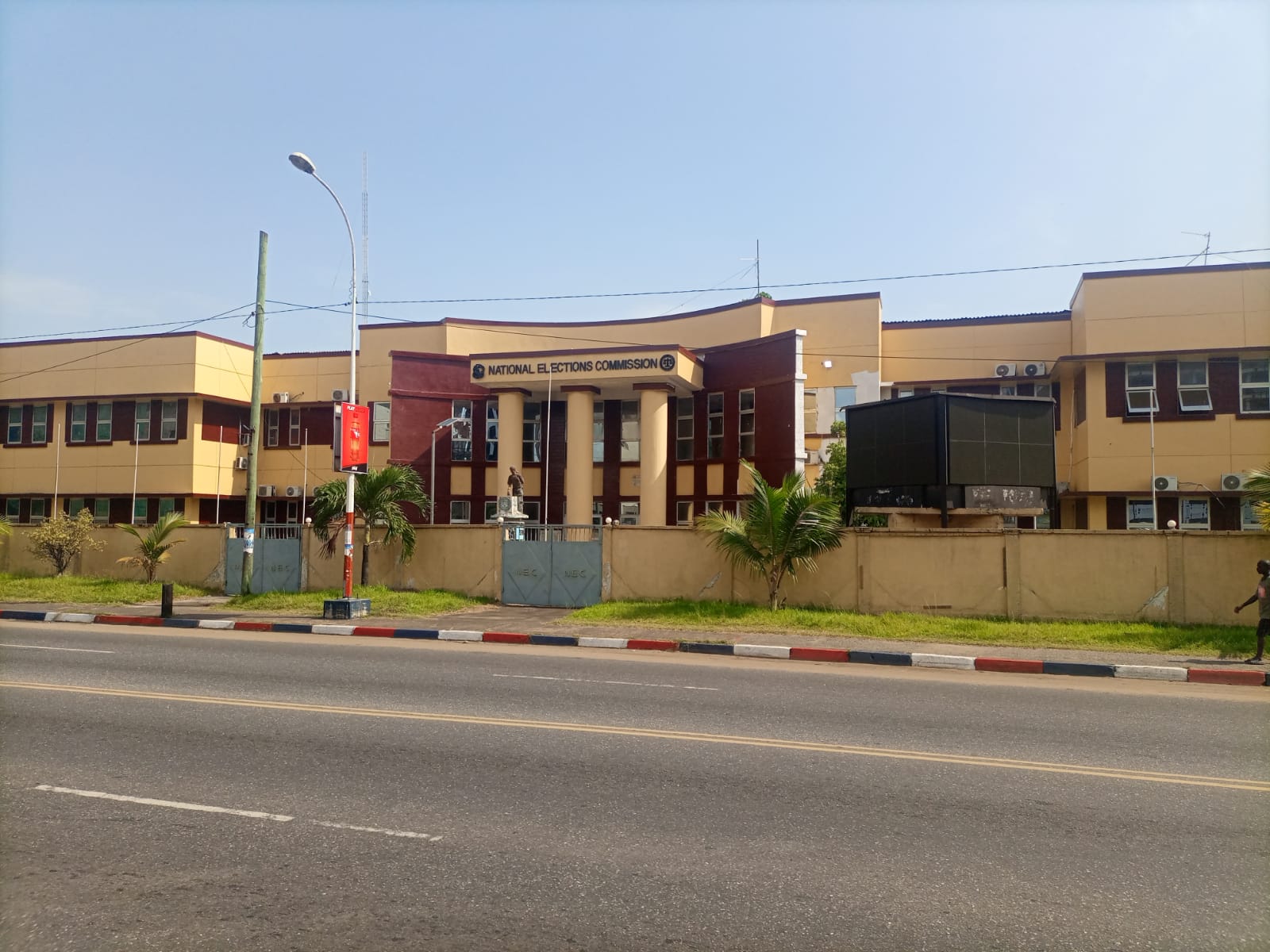Is Liberia heading towards an electoral crisis?

A suspicious census, a cash-strapped electoral commission and voter eligibility based on phenotype signal a dubious October election.

The National Elections Commission, Monrovia, Liberia. Photo courtesy: Bai Best.
Six months before high-stakes presidential and legislative elections scheduled on 10 October 2023, Liberia is engulfed in a cascading crisis that could implode if the National Elections Commission (NEC) does not arrest the slide of logistical errors and political miscalculations.
Liberia’s fourth post-war elections will be held two months after the country commemorates 20 years of ‘peace’ following a protracted war from 1989-2003. Managed single-handedly by Liberian officials for the first time since a 10,000-strong United Nations mission withdrew, these elections will be a litmus test for the country’s fragile peace and security.
The prospects are already worrying.
While the census has been lampooned – the southeastern region, from where the president hails, for instance, showed a dubious 87 percent increase in population in the 15 years since the last census – its final results due to be released in May should have served as the basis for clearly reapportioning constituencies and delineating electoral districts.
The Collaborating Political Parties (CPP), the umbrella group for the fractured opposition, sued the NEC recently for breaching constitutional protocols by commencing voter registration without demarcating electoral constituencies as stipulated in a 2022 national population census whose provisional results were released earlier this year.
The Supreme Court unanimously rejected the suit, ruling that the NEC was not in violation of the constitution, in effect handing the electoral body a contested legitimacy even as questions linger on both the validity of the voter registration exercise and the neutrality of the elections referee.
Populated by political appointees who appear to be loyal to embattled president George Oppong Weah, Liberia’s NEC has repeatedly demonstrated its inability to organise free and fair elections. For months, it was locked in a battle of wills with the government’s procurement regulator over the selection of a biometric voter registration (BVR) supplier. After finally contracting a company, months elapsed before the NEC received approval of any funding from the national legislature thus delaying procurement and delivery of the BVR system.
Liberia’s transition from manual to biometric voter registration is clearly a step in the right direction and, if administered properly, could improve the quality of elections. However, conducting registration six months before election day risks eroding citizens’ trust and undermining the credibility of polling outcomes.
Technical glitches, biometric card shortages and general ineptitude by NEC employees marred the first phase of voter registration which ended on 9 April, dampening hopes for any improvement in subsequent phases involving hard-to-reach political sub-divisions if current challenges are not addressed.
The NEC’s missteps bear repeating here.
Temporary staff hired by the NEC to supervise voter registration have not conducted due diligence in demanding proof of age and citizenship such as passports, national IDs, previous voter cards or testimonies from community members. This means anyone, and we mean anyone, who appears at a centre to register can be issued a BVR card, which has negative implications for the authenticity and reliability of the voter roll. Similarly, individuals who upload their bio details via a personal data portal in advance of arrival at registration centres are not asked to show proof of age and citizenship, thus ruling out further scrutiny of identity.
To add insult to injury, NEC contractors have been instructed only to verify citizenship eligibility if they suspect someone is not Liberian, based on a person’s last name, ‘accent’ and phenotype. These dubious safeguards are prone to abuse since ethnic minorities, mixed-raced nationals and transnational dual citizens may be disenfranchised.
Similarly, widespread ‘trucking’ or movement of citizens from one constituency to another, directly linked to vote buying, has elicited little or no intervention from government authorities. While a few NEC contractors have been dismissed for unethical or unprofessional conduct, these administrative actions are not backed by punitive measures such as prosecution to serve as a deterrent.
Despite the litany of complaints against the NEC, Liberia’s national legislature is partly to blame for the growing pile-up of logistical errors: it approved only a third of the requested budget for the elections thus considerably constraining the electoral body’s capacity. Questions remain about whether sufficient resources, financial and otherwise, will even be available for the actual conduct of elections in October, as a tug-of-war persists between the legislature and the executive.
Political elites have not exactly helped matters.
Although the heads of Liberia’s major parties recently signed a pact, known as the ‘Farmington River Declaration 2023’, to avert any violence that would undermine elections, this performative act of solidarity comes too little too late. Two examples stand out. In one electoral district, voter trucking by political entrepreneurs incited hostility and disrupted the registration process. Similarly, members of the legislature intimidated NEC staff accused of registering foreigners in one political sub-division where a town chief was severely flogged.
While campaign-era physical violence has been sporadic, the electoral irregularities we have observed represent a glaring indication of what Johan Galtung, considered the ‘father’ of peace and conflict studies, called ‘structural violence’. Rules, regulations, norms and beliefs that foment inequality and injustice are imperilling Liberia’s electoral process.
In order to prevent a constitutional catastrophe, the Liberian government must disburse financial resources immediately to the NEC for the timely completion of electoral activities. The NEC must remain vigilant about constitutional mandates related to the rights of voters, political parties and independent candidates as a means of deterring legal challenges at the Supreme Court. State authorities must hold individuals and groups criminally liable for violating the law as a way of dealing with impunity. And last, but certainly not least, the NEC must in its second phase of the BVR process apply eligibility criteria consistently across all registration centres.
If implemented promptly, these recommendations could halt what we fear may be a bungled election that triggers a much wider political crisis.






Great piece. First, thank you fir your time to critically point these serious challenges during the the just end Liberia BVR and if absolutely nothing is done now to correct these partisans intentional errors. Indeed, the country will experience electoral crisis. The signs are on the wall. We already that the Supreme Court of Liberia is now partisans Court. How can NEC rely only on potential/individual uploaded information as authentic source for verification? Liberians must decide the outcomes through a very transparent, fair,free and credible elections. We have gone through a lot as people and country for our emotions to played with. Also, how we hold civil society organizations accountable for not hold policymakers, systems and government agencies fully accountable? Do we have civil society in Liberia or regime society?
The NEC has no legal authority to produce biometric IDs. The only entity in the country legally authorized to do this is the NIR.
There is a difference between IDENTIFICATION and REGISTRATION. The NEC’s task is VOTER REGISTRATION. Because so much money is involved, the NEC has usurped the function of the NIR. This will result in there being MULTIPLE Biometric Identification Systems in the country when there should only be one!
This is fundamentally the reason why systems that work everywhere in the world do not work in Liberia.
You can read the NIR Act here:
http://liberlii.org/lr/legis/acts/nira374/
Does Liberia require a New Electoral System in process procedure?
by Monte McMurchy Civic/Civil Institution Strengthening
An electoral system is [merely] an administrative logistical process designed to ensure that an expressive choice by an entity is both registered and designated to a specific individual or organization without bias or any other form of administrative intimidatory malfeasance.
Liberia does not require ‘a new electoral system’ in that the fundamental civic electoral ontology of probity and trust is no different than that element of trust with the requisite administrative conduct which is required in other electoral jurisdictions whether in North America or Europe.
The civic electoral administrative system ought not be suborned to a particular geographic or ethnic region. An electoral system to be effective must be deemed ‘trust worthy’ and be held to strict public administrative disclosure ensuring that the expressive choice has been expressed in the manner indicated by the elector.
African electoral systems do require localized ‘tweaking’ to ensure that the local African electors are capable of registering their intent without fear or favour. Such tweaking may include pictographs for those people unable to read or write. Logistical extensions in terms of time may be built into the African indigenous electoral process recognizing that transportation of the electoral materials do require time has local infrastructure may require additional time. Media and related public policy concerns must be addressed to ensure that the localized conditions are appropriately represented and addressed ensuring value neutral respect of the civic electoral administrative process.
This in no manner indicates that the essential electoral process is different or requires fundamental intrinsic modification as the essence of the process is no different. Choice registered–choice counted–choice expressed without any external bias or corrupt manner of practice designated to confer an unwarranted advantage to another.
In regions of political administrative fragility greater concern must be addressed to the electoral system fundamentals ensuring that the fundamental civic electoral integrity is not compromised which ought to be an essential consideration for all electoral systems in the world.